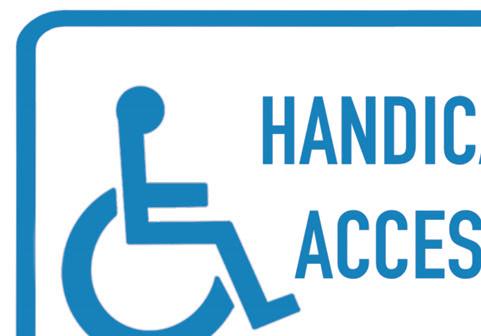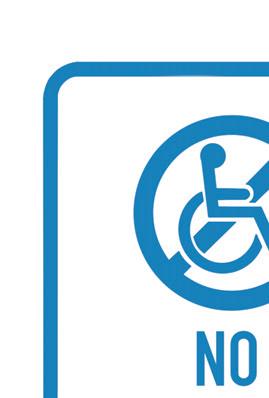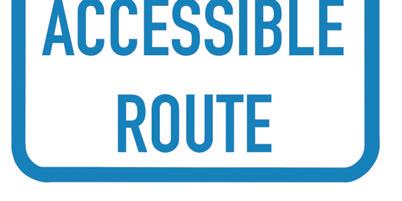
5 minute read
INCLUSIVITY S H O RTFAL L
Northwest is still working to catch buildings up with accessibility regulations
SIDNEY LOWRY Managing Editor | @sidney_lowry
Advertisement
Over 30 years ago, the Americans with Disabilities Act was signed into law and prohibits the discrimination of people with physical or non-physical disabilities on a spectrum anywhere from telecommunications to accommodations within facilities.


There are federal acts universities have to follow, like the Americans with Disabilities Act and the Rehabilitation Act, as well as Missouri-specific laws. Within these, many standards were set on facilities to ensure the accessibility for those with disabilities.
Northwest, which was founded in 1905, has buildings that were first constructed from the late 1800s to the early 1900s. The oldest building on campus is the Thomas Gaunt House, built during the 1870s and has since been renovated many times.
The second oldest building on campus is the Administration Building. Constructed from 1907-1910, the building has since had reconstruction and renovations due to weather damage, a fire and a need for overall updates.
With the history of Northwest buildings dating back over a century, there are buildings that don’t comply with the ADA. The 1990 act and other standard design regulations that have been updated over the last three decades, outlines specific criteria for construction in order to establish accessibility.
Since many campus buildings were constructed before the act and the 1991 Standards for Accessible Design, which requires all buildings that start construction after January 1992 to comply with accessibility design, there are facilities on campus that do not comply with the act.






Assistant Vice President of Facility Services Dan Haslag said there are some buildings that do not comply with the ADA, but Northwest looks to make accessibility improvements wherever it can throughout campus.
Some of these include bathrooms on the third floor of the Administration Building, where the floor leading into the bathroom has a protrusion where people have to step up to get into the bathroom.
“The third floor restrooms (in the Administration Building) are not ADA accessible,” Haslag said in an email to The Missourian. “We are in the process of adjusting signage to direct users to the location of the nearest accessible restrooms, which would be on the second floor.”


When walking through campus buildings, there are accessibility hurdles that can be seen, specifically in bathrooms.
“In the high majority of campus facilities, there are ADA accessible restrooms available,” Haslag said in an email to The Missourian.
Bathrooms in campus facilities aren’t the only amenities that have to comply with the ADA, on every building there has to be push buttons to open doors for people with disabilities. On every campus facility there is a door that is ADA accessible, but some don’t work as of March 18, like the north doors of the Administration Building, or some that have long delays, like the doors of Garrett Strong Science Building.
Haslag said when a maintenance ticket is submitted, it typically takes 24 hours to replace with the exception of having to order parts for the repair.
One in every four adults in the U.S. have a disability, according to the Centers for Disease Control and Prevention. In order to ensure accessibility, Haslag said Facility Services works with Student Affairs and the Title IX and Equity Office to work with University funding each fiscal year to determine priorities toward more accessibility within campus facilities.
Within the ADA and other acts for people with disabilities, there are other provisions that public businesses and universities have to comply with for accessibility.



The Title IX and Equity Office has a branch that handles all accessibility and accommodations, where students can find assistance for their disabilities. Interim Title IX Coordinator Marissa Hotujac said the process of receiving a University accommodation is simple.
“If you have difficulty talking and seeing, walking, if you have any, like psychological disabilities, like ADHD or ADD bipolar disorder, eating disorders, anything like that, if that has been diagnosed by a medical professional, then the students come to our office, and they'll fill out an application and submit a letter of support from their doctor,” Hotujac said.
Accommodation and Proctor Coordinator Weston Carter said the Title IX and Equity Office sees around 300 applications for accommodation every year.
“As accommodation applications come in, I reach out to students, tell them what they need,” Carter said. “I kind of help them through that process … any questions that they have, anything that they haven’t provided to us that they need, you know, I reach out and meet with them if need be.”
Carter said some of the most common accommodations Northwest students have are extended testing time, private testing rooms, emotional support animals and private rooms in residential facilities. Students looking for access to an accommodation can go to the Northwest accessibility and accommodations website.
Carter said while every accommodation request is handled in a week, Hotujac is working to get a policy in place that caps the time for a response to an accommodation to 21 days.
“It's important to have those laws because it, you know, kind of enables the people who have disabilities to have equal access to the University and the education programs and activities,” Hotujac said. “Having those laws requires a university like Northwest to comply with it, and it'll protect those students.”
1 in 4
U.S. adults have a disability.
Crime Log
for the week of March 30





Northwest Missouri State University Police Department
March 26
There is a closed investigation for a fire alarm in Perrin Hall.
March 24
There is a closed investigation for an alcohol violation in Phillips Hall.
March 23
There was an accident between Steven Mosier, 59, and Alejandro Vega, 23, on College Avenue.
March 22
There is a closed investigation for property damage in Parking Lot 42.
There is a closed investigation for property damage in Parking Lot 42.
March 21
There is a closed investigation for a fire alarm in the Olive DeLuce Fine Arts Building.
March 20
There is a closed investigation for a fire alarm in Dieterich Hall.
There is a closed investigation for property damage in Parking Lot 43.
There is a closed investigation for a fire alarm in Perrin Hall.
Maryville Department of Public Safety
March 22
A summons was issued to Yutia Guo, 20, for not having a valid driver’s license, failure to register a motor vehicle and an equipment violation on the 900 block of South Main Street. Keys were recovered on the 100 block of North Vine Street.
March 19
A summons was issued to Amber D. Cooper, 28, for larceny on the 1600 block of South Main Street.
A summons was issued to Dezaray M. Henson, 32, for larceny on the 1600 block of South Main Street.
March 18
A driver’s license was recovered on the 100 block of East Third Street.
A summons was issued to Amber D. Cooper, 28, for larceny on the 1600 block of South Main Street.
A summons was issued to Dezaray M. Henson, 32, for larceny on the 1600 block of South Main Street.
A summons was issued to Camden T. Lutz, 19, for a minor in possession and an equipment violation on the 500 block of South Market Street.
There is an ongoing investigation for a lost or stolen license plate on the 500 block of North Mulberry Street.
A summons was issued to Tanner A. Marquardt, 24, for driving while intoxicated and improper lane usage on the 100 block of East Fifth Street.
March 17
A summons was issued to Gage E. Stephens, 22, for disorderly conduct on the 400 block of North Market Street.
A summons was issued to Kaia R. Calloway, 20, for driving while intoxicated and failure to maintain the right half of the roadway on the 200 block of South Main Street.
There is an ongoing investigation for property damage on the 1600 block of South Main Street.










